

Education Info. Elementary Curriculum. In 2003, the Ministry of Education established a schedule for ongoing curriculum review.
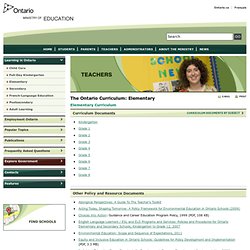
Each year, a number of subject areas enter the review process, to ensure they are kept current, relevant and age-appropriate. The current review cycle will be completed in 2012. Reviews are conducted with great care. Comprehensive information-gathering includes: Studying research in the subject area Comparison with other jurisdictions Focus groups comprised of educators from all Ontario school boards Technical content analysis conducted by subject experts Consultations with stakeholders including: Minister's Advisory Council on Special Education Faculties of Education Employers Parents Students Universities, colleges Other branches of the Ministry of Education Other ministries NGOs (Non-Governmental Organizations).
These sources of information form the basis of recommended revisions to the curriculum. Further stages of review to finalize the curriculum include: Education And Social Justice - Joseph I. Zajda - Google Books. About This Blog. Education is at a crossroads.
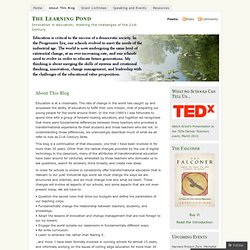
The rate of change in the world has caught up and surpassed the ability of educators to fulfill their core mission, that of preparing our young people for the world around them. In the mid-1980’s I was fortunate to spend time with a group of forward-looking educators, and together we recognized that there were fundamental differences between those teachers who provided a transformational experience for their students and those teachers who did not. In understanding those differences, we unknowingly described much of what we all refer to now as 21st Century Skills. This blog is a continuation of that discussion, one that I have been involved in for more than 30 years. Other than the radical changes provided by the use of digital technology in the classroom, many of the attributes of transformational education have been around for centuries, embodied by those teachers who stimulate us to ask questions, search for answers, think broadly, and create new ideas.
Educating Teachers for Diversity. ISSUE: As the student population in American schools becomes increasingly diverse, educators must respond with school reform efforts that meet the needs of all students.
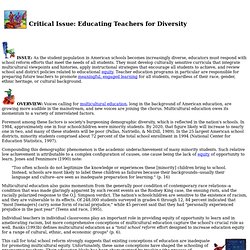
They must develop culturally sensitive curricula that integrate multicultural viewpoints and histories, apply instructional strategies that encourage all students to achieve, and review school and district policies related to educational equity. Teacher education programs in particular are responsible for preparing future teachers to promote meaningful, engaged learning for all students, regardless of their race, gender, ethnic heritage, or cultural background. OVERVIEW: Voices calling for multicultural education, long in the background of American education, are growing more audible in the mainstream, and new voices are joining the chorus. Multicultural education owes its momentum to a variety of interrelated factors. Compounding this demographic phenomenon is the academic underachievement of many minority students. Teachers for Social Justice. About the New Learning Institute. The New Learning Institute brings next-generation educational experiences to young people wherever they are ready to learn: in schools, community programs, libraries, and museums – even the city streets.
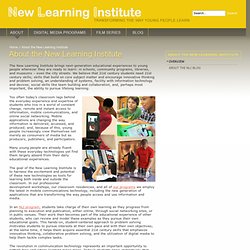
We believe that 21st century students need 21st century skills; skills that build on core subject matter and encourage innovative thinking and problem solving, an understanding of systems, facility with information technology and devices, social skills like team building and collaboration, and, perhaps most important, the ability to pursue lifelong learning. Too often today’s classroom lags behind the everyday experience and expertise of students who live in a world of constant change, remote and instant access to information, mobile communications, and online social networking.
Many young people are already fluent with these everyday technologies yet find them largely absent from their daily educational experiences. Handouts on Equity, Diversity, Multicultural Education, Social Justice. The following printable handouts were designed by EdChange for a variety of different workshops, trainings, and classes.
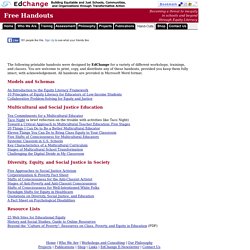
You are welcome to print, copy, and distribute any of these handouts, provided you keep them fully intact, with acknowledgement. All handouts are provided in Microsoft Word format. Models and Schemas An Introduction to the Equity Literacy Framework10 Principles of Equity Literacy for Educators of Low-Income StudentsCollaborative Problem-Solving for Equity and Justice Multicultural and Social Justice Education Ten Commitments for a Multicultural EducatorTaco Night (a brief reflection on the trouble with activities like Taco Night)Toward a Critical Approach to Multicultural Teacher Education: Five Stages20 Things I Can Do to Be a Better Multicultural EducatorEleven Things You Can Do to Bring Class Equity to Your ClassroomFive Shifts of Consciousness for Multicultural EducatorsSystemic Classism in U.S.